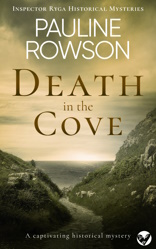
Dialogue is a critical element of characterisation. No matter how much research I do beforehand on characters it is only when I put dialogue into their mouths, and they interact with other characters, do they come alive. Getting it right though can often be tricky. In order for it be believable and realistic the writer has to get into that character's mind-set. We have to know that character's traits and personality.
 In the DI Andy Horton Solent Murder Mysteries, Detective Superintendent Uckfield is coarse, brash and direct. DCI Bliss doesn't suffer fools gladly, she is highly ambitious, efficient and a by-the-book copper, DC Walters is laconic and often witty, while DI Andy Horton is a bit of a tortured soul, impulsive, heroic and deeply empathetic. He doesn't always play by the rules in order to get justice and all this needs to be conveyed on the pages of the novels in the way those characters speak, move, think and behave.
In the DI Andy Horton Solent Murder Mysteries, Detective Superintendent Uckfield is coarse, brash and direct. DCI Bliss doesn't suffer fools gladly, she is highly ambitious, efficient and a by-the-book copper, DC Walters is laconic and often witty, while DI Andy Horton is a bit of a tortured soul, impulsive, heroic and deeply empathetic. He doesn't always play by the rules in order to get justice and all this needs to be conveyed on the pages of the novels in the way those characters speak, move, think and behave.
 Then there is Inspector Ryga in the 1950s set mysteries - patient, thorough, quiet, analytical, haunted by his war time experiences. His manner of speech needs to not only reflect this but also the words and phrases he uses need to be of that era and not the modern day, which brings me on to the subject of swearing.
Then there is Inspector Ryga in the 1950s set mysteries - patient, thorough, quiet, analytical, haunted by his war time experiences. His manner of speech needs to not only reflect this but also the words and phrases he uses need to be of that era and not the modern day, which brings me on to the subject of swearing.
Swearing was used very sparingly in public in the 1950s and would not be tolerated or used as it is often today as everyday language (sadly in my view).
 OK so sometimes your characters will swear, it's part of their personality, and it could be a reaction to an extremely stressful and dangerous situation. It needs to be included and conveyed in the right place, time and manner but not all the time. Art Marvik in the mystery thrillers is an action man - a former Royal Marine Commando now working undercover for the National Intelligence Marine Squad. He is put into dangerous situations and can act outside the law. It is more natural for him to swear in deadly operations dealing with ruthless killers, he does, but I can assure you sparingly and only where the script demands it.
OK so sometimes your characters will swear, it's part of their personality, and it could be a reaction to an extremely stressful and dangerous situation. It needs to be included and conveyed in the right place, time and manner but not all the time. Art Marvik in the mystery thrillers is an action man - a former Royal Marine Commando now working undercover for the National Intelligence Marine Squad. He is put into dangerous situations and can act outside the law. It is more natural for him to swear in deadly operations dealing with ruthless killers, he does, but I can assure you sparingly and only where the script demands it.
Dialect is another tricky area. To my mind it should be used sparingly. Yes, dialect can convey your character and give local colour to a novel but too much is very wearing on the reader and can become incomprehensible.
Dialogue's purpose is to help move the plot forward and impart necessary information. It gives flavour to the characters and makes them become 'real'. It can also add speed, depth and emotion.
People don’t always answer questions; conversations are not linear. When writing though authors need to make it clear what is happening and who is speaking. However, anyone who has read the Maigret novels knows that George Simenon frequently broke this rule. It can be confusing but the plots always move rapidly!
Developing an ear for dialogue is part of an author's job. Alfred Hitchcock said that a good story was 'life, with the dull parts taken out' dialogue should follow the same rule: it is human conversation without the ums and ahs, superfluous words including swearing!
So on with the dialogue, which I.. er.. in fact I enjoy writing!
Pauline Rowson lives on the South Coast of England and is the best selling author of many crime novels, published by Joffe Books. Her popular crime novels include the DI Andy Horton Solent Murder Mystery series, the Art Marvik mystery thrillers and the 1950s set Inspector Ryga mysteries. Subscribe to her newsletter for all the latest books news.